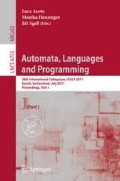Abstract
A (d,ℓ)-list disjunct matrix is a non-adaptive group testing primitive which, given a set of items with at most d “defectives,” outputs a superset of the defectives containing less than ℓ non-defective items. The primitive has found many applications as stand alone objects and as building blocks in the construction of other combinatorial objects.
This paper studies error-tolerant list disjunct matrices which can correct up to e 0 false positive and e 1 false negative tests in sub-linear time. We then use list-disjunct matrices to prove new results in three different applications.
Our major contributions are as follows. (1) We prove several (almost)-matching lower and upper bounds for the optimal number of tests, including the fact that Θ(dlog(n/d) + e 0 + de 1) tests is necessary and sufficient when ℓ = Θ(d). Similar results are also derived for the disjunct matrix case (i.e. ℓ = 1). (2) We present two methods that convert error-tolerant list disjunct matrices in a black-box manner into error-tolerant list disjunct matrices that are also efficiently decodable. The methods help us derive a family of (strongly) explicit constructions of list-disjunct matrices which are either optimal or near optimal, and which are also efficiently decodable. (3) We show how to use error-correcting efficiently decodable list-disjunct matrices in three different applications: (i) explicit constructions of d-disjunct matrices with t = O(d 2logn + rd) tests which are decodable in poly(t) time, where r is the maximum number of test errors. This result is optimal for r = Ω(dlogn), and even for r = 0 this result improves upon known results; (ii) (explicit) constructions of (near)-optimal, error-correcting, and efficiently decodable monotone encodings; and (iii) (explicit) constructions of (near)-optimal, error-correcting, and efficiently decodable multiple user tracing families.
Access this chapter
Tax calculation will be finalised at checkout
Purchases are for personal use only
Preview
Unable to display preview. Download preview PDF.
References
Alon, N., Asodi, V.: Tracing many users with almost no rate penalty. IEEE Trans. Inform. Theory 53(1), 437–439 (2007)
Alon, N., Hod, R.: Optimal monotone encodings. IEEE Transactions on Information Theory 55(3), 1343–1353 (2009)
Cheraghchi, M.: Noise-resilient group testing: Limitations and constructions. In: Kutyłowski, M., Charatonik, W., Gębala, M. (eds.) FCT 2009. LNCS, vol. 5699, pp. 62–73. Springer, Heidelberg (2009)
Cormode, G., Muthukrishnan, S.: What’s hot and what’s not: tracking most frequent items dynamically. ACM Trans. Database Syst. 30(1), 249–278 (2005)
De Bonis, A., Gąsieniec, L., Vaccaro, U.: Optimal two-stage algorithms for group testing problems. SIAM J. Comput. 34(5), 1253–1270 (2005)
Du, D.Z., Hwang, F.K.: Combinatorial group testing and its applications, 2nd edn. Series on Applied Mathematics, vol. 12. World Scientific Publishing Co. Inc., River Edge (2000)
D’yachkov, A.G., Rykov, V.V.: A survey of superimposed code theory. Problems Control Inform. Theory/Problemy Upravlen. Teor. Inform. 12(4), 229–242 (1983)
D’yachkov, A.G., Rykov, V.V., Rashad, A.M.: Superimposed distance codes. Problems Control Inform. Theory 18(4), 237–250 (1989)
Erdős, P., Frankl, P., Füredi, Z.: Families of finite sets in which no set is covered by the union of r others. Israel J. Math. 51(1-2), 79–89 (1985)
Füredi, Z.: On r-cover-free families. J. Combin. Theory Ser. A 73(1), 172–173 (1996)
Ganguly, S.: Data stream algorithms via expander graphs. In: Hong, S.-H., Nagamochi, H., Fukunaga, T. (eds.) ISAAC 2008. LNCS, vol. 5369, pp. 52–63. Springer, Heidelberg (2008)
Goodrich, M.T., Atallah, M.J., Tamassia, R.: Indexing information for data forensics. In: Third International Conference on Applied Cryptography and Network Security (ANCS), pp. 206–221 (2005)
Indyk, P.: Explicit constructions of selectors and related combinatorial structures, with applications. In: SODA, pp. 697–704 (2002)
Indyk, P., Ngo, H.Q., Rudra, A.: Efficiently decodable non-adaptive group testing. In: Proceedings of the Twenty-First Annual ACM-SIAM Symposium on Discrete Algorithms (SODA), pp. 1126–1142 (2010)
Kainkaryam: Pooling in high-throughput drug screening. Current Opinion in Drug Discovery & Development 12(3), 339–350 (2009)
Khattab, S.M., Gobriel, S., Melhem, R.G., Mossé, D.: Live baiting for service-level dos attackers. In: INFOCOM, pp. 171–175 (2008)
Moran, T., Naor, M., Segev, G.: Deterministic history-independent strategies for storing information on write-once memories. Theory of Computing 5(1), 43–67 (2009)
Ngo, H.Q., Du, D.Z.: A survey on combinatorial group testing algorithms with applications to DNA library screening. In: Discrete Mathematical Problems with Medical Applications. DIMACS Ser. Discrete Math. Theoret. Comput. Sci., vol. 55, pp. 171–182. Amer. Math. Soc., Providence (2000)
Parvaresh, F., Vardy, A.: Correcting errors beyond the Guruswami-Sudan radius in polynomial time. In: Proceedings of the 46th Annual IEEE Symposium on Foundations of Computer Science (FOCS), pp. 285–294 (2005)
Porat, E., Rothschild, A.: Explicit non-adaptive combinatorial group testing schemes. In: Aceto, L., Damgård, I., Goldberg, L.A., Halldórsson, M.M., Ingólfsdóttir, A., Walukiewicz, I. (eds.) ICALP 2008, Part I. LNCS, vol. 5125, pp. 748–759. Springer, Heidelberg (2008)
Rashad, A.M.: Random coding bounds on the rate for list-decoding superimposed codes. Problems Control Inform. Theory/Problemy Upravlen. Teor. Inform. 19(2), 141–149 (1990)
Rudra, A., Uurtamo, S.: Data stream algorithms for codeword testing. In: Abramsky, S., Gavoille, C., Kirchner, C., Meyer auf der Heide, F., Spirakis, P.G. (eds.) ICALP 2010. LNCS, vol. 6198, pp. 629–640. Springer, Heidelberg (2010)
Ruszinkó, M.: On the upper bound of the size of the r-cover-free families. J. Combin. Theory Ser. A 66(2), 302–310 (1994)
Author information
Authors and Affiliations
Editor information
Editors and Affiliations
Rights and permissions
Copyright information
© 2011 Springer-Verlag Berlin Heidelberg
About this paper
Cite this paper
Ngo, H.Q., Porat, E., Rudra, A. (2011). Efficiently Decodable Error-Correcting List Disjunct Matrices and Applications. In: Aceto, L., Henzinger, M., Sgall, J. (eds) Automata, Languages and Programming. ICALP 2011. Lecture Notes in Computer Science, vol 6755. Springer, Berlin, Heidelberg. https://doi.org/10.1007/978-3-642-22006-7_47
Download citation
DOI: https://doi.org/10.1007/978-3-642-22006-7_47
Publisher Name: Springer, Berlin, Heidelberg
Print ISBN: 978-3-642-22005-0
Online ISBN: 978-3-642-22006-7
eBook Packages: Computer ScienceComputer Science (R0)

